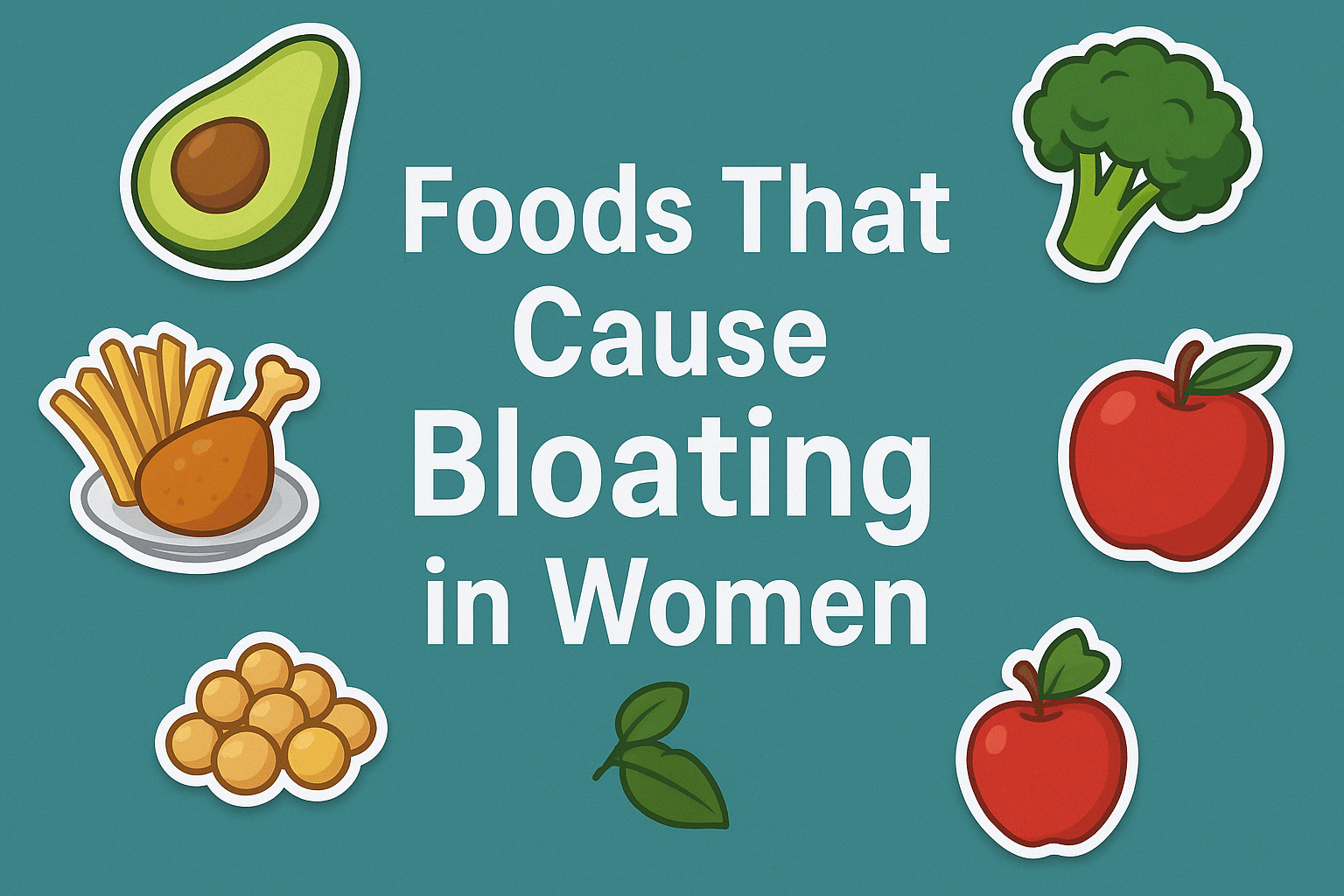Table of Contents
Feeling bloated after eating? Learn what foods from milk chocolate to broccoli, secretly trigger bloating, why it happens, and simple ways to ease it naturally. A few mindful swaps and habits can make all the difference.

We all know that uncomfortable feeling, your jeans feel tighter, your belly feels heavy, and you just don’t feel like yourself. That’s bloating, and while it’s common, it’s not something you have to live with every day.
Here’s the good news: most bloating isn’t serious. It’s your gut reacting to certain foods, lifestyle habits, or even hormonal changes. Once you understand what’s causing it, you can easily manage it with mindful eating and small daily tweaks.
Why Does Bloating Happen in the First Place?
Bloating usually happens when your digestive system traps extra gas or struggles to break down food properly. For women, it can also be linked to hormonal changes, PMS, or stress.
Here are some common triggers:
- Eating too fast or skipping meals
- Overeating or consuming fried, sugary, or salty foods
- Consuming high-fiber foods too quickly
- Drinking carbonated beverages
- Hormonal fluctuations during menstrual cycles
The key isn’t avoiding food altogether, it’s learning which foods may not agree with your system and how to make gentle swaps.
Foods That Commonly Cause Bloating (and Why)
Here are some everyday foods that might secretly be making you feel bloated:
1. Milk Chocolate
Why it causes bloating: Milk chocolate contains both sugar and dairy — two ingredients that can ferment in your gut and create excess gas, especially if you’re lactose sensitive.
Try instead: Dark chocolate with 70% or more cocoa for that sweet fix without the dairy overload.
2. Fried Foods
Why it causes bloating: High-fat foods slow down digestion, making your stomach feel heavy for longer periods.
Try instead: Air-fried or baked snacks — lighter and just as satisfying.
3. Lettuce
Why it causes bloating: Iceberg lettuce can trap air in your digestive tract, especially when eaten raw in large portions.
Try instead: Spinach or kale — they’re nutrient-rich and easier on your stomach.
4. Pears
Why it causes bloating: Pears are high in sorbitol, a natural sugar alcohol that some people find hard to digest.
Try instead: Berries like strawberries and raspberries — sweet, fiber-rich, and gut-friendly.
5. Chickpeas (and other legumes)
Why it causes bloating: Chickpeas contain oligosaccharides — complex sugars that your gut bacteria ferment, creating gas.
Try instead: Soak or boil chickpeas well before eating, or switch to lentils, which are easier to digest.
6. Avocado
Why it causes bloating: Though healthy, avocados contain polyols (natural sugar alcohols) that can trigger bloating in sensitive people.
Try instead: Cucumbers or zucchini for a light, hydrating swap.
7. Broccoli
Why it causes bloating: A cruciferous veggie packed with fiber — but that same fiber releases gas as it breaks down in your gut.
Try instead: Lightly steamed broccoli or switch to spinach for fewer digestion issues.
8. Apples
Why it causes bloating: Apples are high in fructose and fiber, which can ferment and lead to gas buildup.
Try instead: Bananas or papaya — both soothe digestion and help reduce bloating naturally.
How to Reduce Bloating Naturally at Home
You don’t need complicated routines or fancy supplements to manage bloating. Sometimes, the best solutions are simple habits you can add to your everyday life:
Eat slowly: Chew your food well and avoid gulping — it helps reduce swallowed air.
Stay hydrated: Water supports digestion and helps flush out excess sodium.
Take short walks after meals: Movement helps your digestive system function smoothly.
Try herbal teas: Peppermint, fennel, or ginger tea can ease bloating and relax your gut.
Get enough rest: Lack of sleep can slow digestion and worsen bloating.
When Should You Worry About Bloating?
Occasional bloating is normal, but if it happens frequently or comes with pain, nausea, or changes in bowel habits, it might be worth checking with a healthcare professional. Sometimes, it could indicate underlying issues like IBS, lactose intolerance, or food sensitivities.
The Bottom Line
Bloating doesn’t mean your body is doing something wrong — it’s just asking you to pay a little more attention. Swap heavy, gas-producing foods for lighter options, eat mindfully, and give your gut some rest and care.
Your body will thank you — one comfortable meal at a time.

